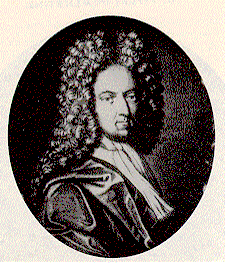

Defoe, Daniel (1660?-1731), English novelist and journalist, whose work reflects his diverse experiences in many countries and in many walks of life. Besides being a brilliant journalist, novelist, and social thinker, Defoe was a prolific author, producing more than 500 books, pamphlets, and tracts.
Defoe was born in London about 1660, the son of a candle merchant named Foe. Daniel added "De" to his name about 1700. He was educated for the Presbyterian ministry but decided in 1685 to go into business. He became a hosiery merchant, and his business gave him frequent opportunities to travel throughout western Europe.
An opponent of the Roman Catholic King James II, in 1685 Defoe took an active part in the unsuccessful rebellion led by the Duke of Monmouth against the king. In 1692 his business went into bankruptcy, but subsequently he acquired control of a tile and brick factory. He obtained a government post in 1695 and the same year wrote An Essay upon Projects, a remarkably keen analysis of matters of public concern, such as the education of women. Especially noteworthy among his writings during the next several years was the satiric poem The True-born Englishman (1701), an attack on beliefs in racial or national superiority, which was directed particularly toward those English people who resented the new king, William III, because he was Dutch.
The following year Defoe anonymously published a tract entitled The Shortest Way with the Dissenters, which satirized religious intolerance by pretending to share the prejudices of the Anglican church against Nonconformists. In 1703, when it was found that Defoe had written the tract, he was arrested and given an indeterminate term in jail. Robert Harley, the speaker of the House of Commons, secured his release in November 1703, probably on the condition that he agree to become a secret agent and public propagandist for the government.
During his imprisonment Defoe's business had been ruined, so he turned to journalism for his livelihood. From 1704 to 1713 he issued a triweekly news journal entitled The Review, for which he did most of the writing. Its opinions and interpretations were often independent, but generally, The Review leaned toward the government in power. Defoe wrote strongly in favor of union with Scotland, and his duties as secret agent may have entailed other activities on behalf of union, which was achieved in 1707. In 1709 he wrote a History of the Union.
Defoe's first and most famous novel, The Life and
Strange Surprizing Adventures of Robinson Crusoe, of York, Mariner, appeared
in 1719, when he was almost 60 years old. The book is commonly known as
Robinson Crusoe. A fictional tale of a shipwrecked sailor, it was based
on the adventures of a seaman, Alexander Selkirk, who had been marooned
on one of the Juan Fernández Islands off the coast of Chile. The
novel, full of detail about Crusoe's ingenious attempts to overcome the
hardships of the island, has become one of the classics of children's literature.
More novels followed, including Memoirs of a Cavalier (1720), Captain Singleton
(1720), and The Fortunes and Misfortunes of Moll Flanders (1722), the adventures
of a London prostitute, which is regarded as one of the great English novels.
Among his other important writings are A Journal of the Plague Year (1722),
Colonel Jack (1722), Roxana (1724), A Tour Through the Whole Island of
Great Britain (1724-1727), A General History of the Pirates (1724-1728),
and The Complete English Tradesman (1725-1727).
"Defoe, Daniel," Microsoft® Encarta® Encyclopedia 2000. © 1993-1999 Microsoft Corporation. All rights reserved.
This site is © 2000 by the Brothers Heuss
Please address any questions to the webmaster
Designed and Maintained by Cyber Learning Studios
Since 23 Oct 00 10:09pm EST this site has had 320974
visitors
Academic
Year 00-01
07/02/2001
©a.r.e.a.
Dr. Vicente Forés López
©Ana
Aroa Alba Cuesta
Universitat
de València Press